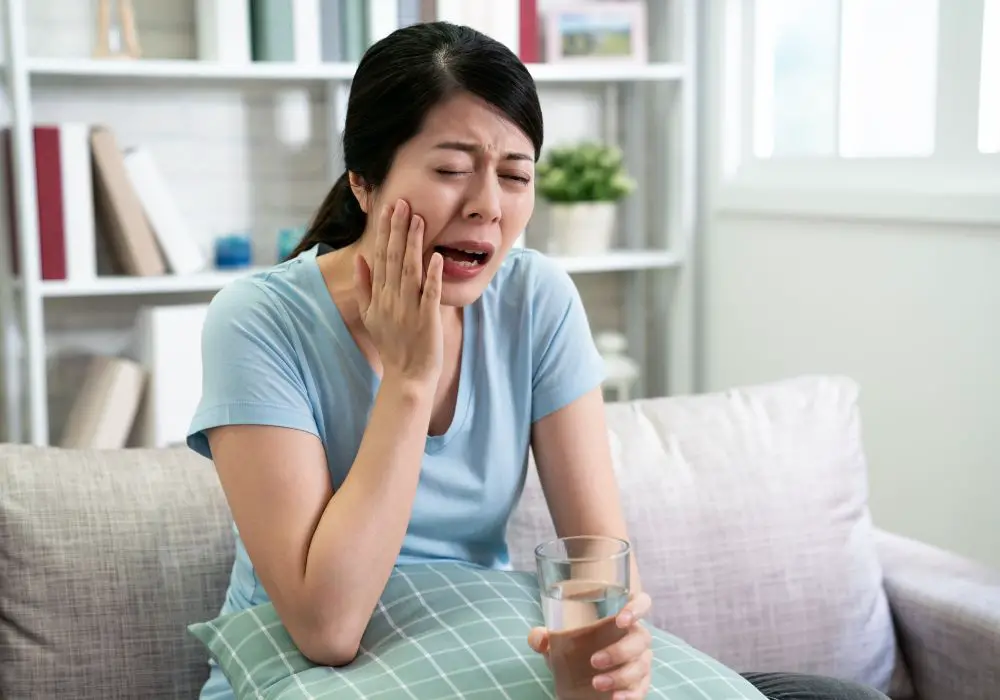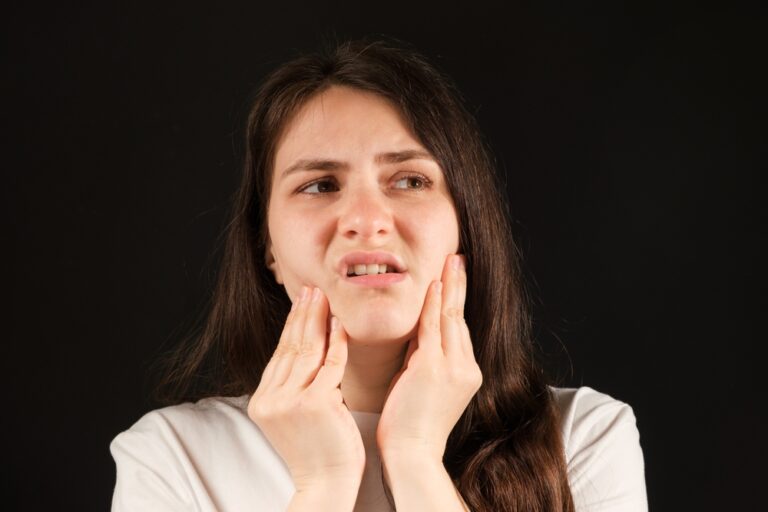Do you ever notice that your teeth start to ache or become extra sensitive when you’re sick, stressed or just generally not feeling well? There’s actually a scientific explanation behind this common phenomenon.
In this comprehensive article, we’ll take a deep dive into:
- The connection between overall health and dental pain
- Potential causes of tooth sensitivity when unwell
- Tips to find relief from discomfort
- When it’s time to see a dentist
- And more
So if you’ve ever wondered why your teeth hurt when you have a cold or feel rundown, keep reading for helpful insights.
The Mouth-Body Connection

Emerging research continues to uncover important links between oral health and overall wellbeing. Periodontal or gum disease has been tied to an increased risk of serious conditions like heart disease, stroke, diabetes, and pneumonia.
But it’s not just a one-way relationship – your physical health can also impact your oral health. When something is going on in your body like an illness, infection, or inflammation, you may notice it in increased tooth sensitivity, pain, or gum problems.
How Inflammation Triggers Dental Pain
Your teeth are held firmly in the jawbone by the periodontal ligament – a soft tissue that acts as a shock absorber and support system. This ligament contains tiny nerve endings that are extremely sensitive tohot and cold foods or changes in pressure.
Under normal conditions, this arrangement protects your teeth from damage. But when your body is undergoing an inflammatory response to illness or stress, these nerve fibers become extra sensitive and can transmit stronger pain signals in response to things like air, hot or cold food/drink, or pressure on the teeth.
Let’s examine this mechanism in more detail:
- When you have a viral or bacterial infection, your immune system releases pro-inflammatory mediators like prostaglandins, cytokines, chemokines and others into the bloodstream.
- These chemical compounds have systemic effects throughout the body – one of which is that they lower the pain threshold and heighten sensitivity of the nerves in your teeth.
- The swollen, aggravated nerves transmit amplified signals of discomfort to your brain when provoked by hot/cold foods or changes in pressure.
- Factors like illness, stress, hormonal changes, aging, and autoimmune issues can all trigger widespread inflammation in the body – which explains why your teeth tend to hurt most when you are unwell.
- Once the underlying condition improves and inflammation subsides, the dental nerve sensitivity usually resolves as well.
Now let’s look at some of the most common health triggers that can cause your teeth to hurt when you’re under the weather:
Illness or Infection
Viral Infections
When you come down with a cold, flu, sinus infection, mono, or other viruses, your immune system instantly responds with inflammation. Your body gets flooded with inflammatory chemicals and proteins that make the nerves in your teeth overly sensitive and likely to transmit pain signals.
Colds and flu also make you more vulnerable to tooth sensitivity because congestion and bouts of coughing can increase pressure in your mouth, jaw and ears. Viruses like mono that cause swollen lymph nodes can put extra pressure on nearby nerves.
Bacterial Infections
Bacterial illnesses and infections also trigger the release of potent inflammatory chemicals as your body tries to fight off the foreign invaders. Bronchitis, pneumonia, strep throat, ear infections and UTIs involve swelling that can travel to the mouth and enhance tooth sensitivity.
Respiratory Infections
Any type of infection or inflammation that affects your upper or lower respiratory system can irritate connecting nerves and have systemic effects. The immune response generates inflammatory proteins that make all your nerves extra touchy, including those controlling pain signals from your teeth. COPD flare-ups, bronchitis, sinusitis and asthma attacks fall in this category.
Digestive Upsets
Inflammation anywhere along your GI tract whether it’s food poisoning, an ulcer, IBS or bowel diseases like Crohn’s and Colitis can heighten tooth sensitivity. When your digestive system has issues, it triggers the release of inflammatory markers into the blood. As these travel through your circulation, they reach nerve fibers in the teeth making them more prone to transmitting pain.
Stress and Anxiety
Experiencing occasional stress is a normal part of life. But when you undergo prolonged or chronic stress and anxiety, it can have deleterious effects on both your mental and physical health:
- Stress hormones like cortisol and adrenaline when elevated long-term trigger widespread inflammation in the body. This lowers the pain threshold of nerves.
- Chronic stress also causes some people to unconsciously clench their jaw muscles or grind their teeth at night. This excessive pressure can fracture enamel, expose sensitive dentin, and irritate nerves in the teeth and jaw joint.
- Chewing the lip or fingernails – common anxious habits – can also chip teeth making them more prone to sensitivity.
Just like illness, stress-induced inflammation is usually temporary and subsides once life gets more stable. But take care to avoid habits that could permanently damage enamel or your bite.
Hormonal Shifts
Since hormones regulate many functions in the body, it makes sense that hormonal fluctuations can also impact your oral health. Common scenarios where this occurs include:
- Menstruation – Shifting estrogen and progesterone levels in the days leading up to your period trigger mild inflammation. Many women experience sensitive teeth for 1-2 days before their cycle starts due to this.
- Pregnancy – Hormone surges and increased blood circulation during pregnancy often lead to swollen gums and sensitive teeth. Estrogen and progesterone are at their peak.
- Menopause – Falling estrogen after menopause causes dry mouth and thinning gum tissues. This can expose more sensitive dentin and cause teeth to feel more prone to sensitivity.
- Puberty – Just like other tissues in the body, the gums and oral mucosa become extra inflamed and sensitive in response to surging androgens and growth hormones during puberty.
Aging
As we age, receding gums due to periodontal disease is common. This gum loss exposes the tooth roots which have softer dentin not protected by hard enamel. Older teeth are therefore more prone to sensitivity and decay.
Aging also dulls the pains sensation nerves transmit. But research shows some actually become hypersensitive and fire more readily with age. Together, these aging factors explain increased rates of tooth sensitivity in older adults. Proper home care and dental cleanings help minimize this.
Autoimmune Conditions
Autoimmune disorders like rheumatoid arthritis, lupus, and Sjogren’s syndrome involve systemic inflammation that can impact tissues anywhere in the body, including your gums and teeth. The widespread swelling makes nerves more sensitive while also increasing risk for cavities and gum disease.
Those with autoimmune issues should practice meticulous oral home care and mention any tooth sensitivity to their dentist and doctor to rule out complications.
Medications
Certain prescription drugs list dry mouth or tooth sensitivity as potential side effects. Medications where this may occur include:
- Blood pressure and heart medications
- Antidepressants and anxiety medications
- Antihistamines and decongestants
- Muscle relaxers
- Chemotherapy drugs
- Dopamine agonists
Saliva helps buffer acids and maintain healthy tissues in the mouth. Insufficient saliva allows bacteria to proliferate, erode enamel, and inflame nerves. Switching medications or using saliva substitutes can ease discomfort. Inform all your healthcare providers if you experience dental side effects.
Relieving Tooth Sensitivity When You’re Under the Weather

While tooth sensitivity and pain accompanying illness often resolves once the body fully recovers, it can still be uncomfortable to deal with in the moment. Here are some tips to help relieve tooth discomfort and sensitivity when you’re not feeling well until it passes:
Avoid Food and Drink Triggers
Since hot and cold foods are common triggers, take care to avoid them when your teeth are inflamed. Stick to room temp foods and beverages until the nerves calm down. Crunchy, hard, chewy, and sticky foods that put pressure on teeth may also aggravate pain. Opting for softer foods is wise until your symptoms improve.
Use a Sensitive Toothpaste
Choose a toothpaste designed specifically for sensitive teeth while you recover from illness. Ingredients like potassium nitrate and stannous fluoride work by calming overexcited nerve fibers. Using a soft brush also prevents pressure on inflamed gums. Brush twice daily and avoid whitening toothpastes as these can further irritate.
Try a Topical Desensitizing Gel
Products like Sensodyne Rapid Relief can provide temporary numbing and pain relief when applied to sensitive teeth after brushing. This may help you get through meals more comfortably until inflammation and sensitivity subsides.
Take Over-the-Counter Pain Relievers
Anti-inflammatory medications like ibuprofen, naproxen, and other NSAIDs can help reduce swelling and discomfort associated with tooth sensitivity. Follow dosage instructions and don’t exceed the daily limit unless directed by your doctor.
Use Cold Compresses
Applying something cold like an ice pack or cold compress to your cheek outside the painful area constricts blood vessels and inhibits pain signals. Do this for 10-15 minutes as needed to alleviate tooth discomfort.
Improve Your Oral Hygiene Routine
Gentle flossing removes plaque and debris that get trapped near the gums and can worsen sensitivity. When ill, be extra thorough with brushing and flossing since bacteria thrive in an inflamed environment. Avoid irritating whitening products during illness.
Get More Vitamin D
Emerging research has found a link between vitamin D deficiency and rates of tooth sensitivity. Have your levels checked and supplement accordingly after consulting your doctor. Vitamin D helps control inflammation.
Reduce Stress
Chronic stress indirectly activates inflammation through sustained elevations in cortisol, adrenaline and inflammatory cytokines like IL-6. When under duress, calming activities like mindfulness, meditation, yoga, and deep breathing exercises can lower these chemicals and ease systemic inflammation that amplifies dental pain.
Visit your Dentist for Evaluation
If sensitive teeth do not start improving within 2-3 days after you recover from illness, it’s a good idea to get evaluated by your dentist. Prolonged sensitivity can sometimes indicate an underlying dental issue needing treatment such as a cracked tooth, cavity, or gum disease. Catching problems early prevents bigger issues down the road.
When to See Your Dentist

It’s fairly common for teeth to become temporarily sensitive when your body is fighting an illness and inflammation is high. However, if the discomfort persists long after your main sickness improves, doesn’t resolve with OTC relief methods, or is severe, it warrants having your dentist take a look.
Prolonged tooth sensitivity even after recovering from illness can potentially signal:
- Tooth decay or cavities – caries damage to enamel allows hot/cold liquids to aggravate the exposed dentin.
- Cracked or fractured teeth – cracks allow irritants inside the tooth activating nerves. Invisible cracks are common culprits.
- Worn tooth enamel – enamel protects the sensitive dentin underneath. When it erodes, teeth become more prone to pain.
- Gum recession – receding gums expose vulnerable tooth roots made of softer dentin that transmits pain more readily.
- Grinding and TMJ – wearing down enamel through bruxism or TMJ dysfunction irritates nerves.
- Orthodontic complications – issues with braces, retainers, or shifting teeth can impinge nerves.
- Oral infections – untreated gum disease provides an inflammatory source that keeps nerves aggravated.
Seeing your dentist for a checkup allows proper diagnosis of the underlying issue causing ongoing discomfort. From there, they can provide targeted treatment like decay removal, crown placement, bite adjustment, gum grafts, night guard fitting, antibiotics or tooth extraction to relieve pain and prevent bigger problems. Don’t ignore persistent tooth sensitivity as doing so allows damage to spread.
Key Takeaways: Why Teeth Hurt When Unwell
- Temporary tooth sensitivity when sick is caused by inflammation from illness that makes nerves extra sensitive. This often resolves once the immune response dies down.
- Common triggers include viral/bacterial infections, chronic stress, hormones, aging, autoimmune issues, and medication side effects.
- Try OTC relief remedies like sensitivity toothpaste, dental gels, pain relievers, cold compresses, vitamin D, and oral hygiene.
- See your dentist right away if sensitivity remains after recovering, is severe, or disturbs sleep and eating.
- Prolonged pain can signal dental issues needing evaluation like decay, cracked teeth, TMJ, gum disease, orthodontic problems.
- Caring for your oral health protects both your teeth and your overall wellbeing. Being aware of tooth sensitivity patterns allows you to respond promptly.
Monitoring your mouth and how it responds to illness provides valuable insight into your body’s inflammatory status. While temporary sensitivity is expected when under the weather, don’t ignore signs indicating potential dental problems warranting a professional assessment. With the right care, your teeth should bounce back after sickness passes.
Frequently Asked Questions
Why do my teeth hurt so bad when I have a cold or flu?
Viral infections like a cold or flu trigger your immune system to release large amounts of inflammatory chemicals into your bloodstream. These include prostaglandins, histamines, cytokines and more. The widespread inflammation makes all the nerve fibers in your body extra sensitive, including those in your teeth. This lowers the pain threshold so even small things like hot or cold foods can set off exaggerated pain signals. The good news is that dental sensitivity from viral illness usually resolves within a few days as you recover and inflammation dies down.
Why are my teeth sensitive on my period?
Hormonal fluctuations right before and during your period can cause mild inflammation in the body. Levels of estrogen and progesterone rise and fall rapidly in the days leading up your cycle. This makes some women prone to sensitive teeth for 1-2 days before their period starts when hormones are in greater flux. The sensitivity tends to resolve quickly once your period begins and hormones stabilize. Using a desensitizing toothpaste for those couple of days can provide relief.
Why are my teeth so sensitive after having a baby?
Pregnancy involves major hormonal surges that can inflame your gums and make teeth sensitive while pregnant. Postpartum drops in estrogen may also worsen sensitivity. New moms are at higher risk as osteoporosis from breastfeeding removes calcium from bones and teeth. Using a soft toothbrush, fluoride toothpaste, and diligent oral hygiene helps prevent prolonged problems after giving birth. Let your dentist know about any discomfort at your next cleaning.
What helps sensitive teeth from stress?
Chronic stress indirectly creates inflammation through elevated stress hormones like cortisol and adrenaline. It also triggers grinding, clenching and chewing behaviors that put excessive force on teeth. For stress-related sensitivity, try relaxation techniques like meditation, mindfulness and yoga to calm the body. Gentle jaw massages, OTC pain relief medication, warm compresses, and avoiding hard/cold foods that trigger pain can also provide relief.
When should I see a dentist for sensitive teeth with illness?
It’s normal for teeth to be temporarily sensitive with infection or inflammation. But if the discomfort lingers more than 2-3 days after your main illness improves, is very severe, or doesn’t respond to OTC remedies, seeing your dentist is recommended. Prolonged sensitivity can sometimes indicate underlying problems needing treatment like tooth decay, gum disease, TMJ/grinding disorders or orthodontic issues. Getting evaluated prevents small problems from worsening over time.







